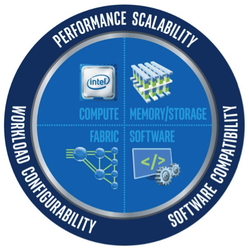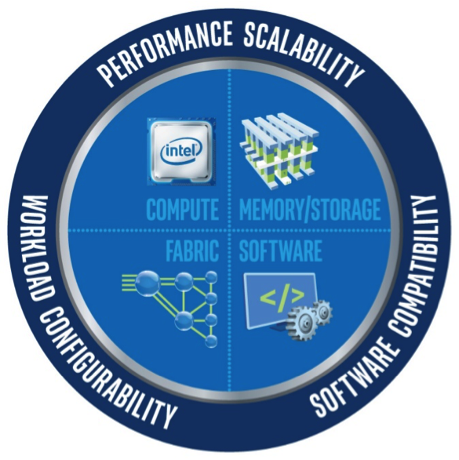
Jan. 4, 2017
By: Intel Corporation
Announcements during SC16 included new Intel® Xeon® processors, Intel® Xeon Phi™ processors, Intel® HPC Orchestrator, Intel® Deep Learning Inference Accelerator and more
 As the field of supercomputing continues its rapid adoption path across many industries, developers and users alike seek to reduce system complexity, while simultaneously increasing flexibility, performance and energy efficiency. At SC16, Intel unveiled several updates and additions to their HPC portfolio which will help customers address those challenges and more.
As the field of supercomputing continues its rapid adoption path across many industries, developers and users alike seek to reduce system complexity, while simultaneously increasing flexibility, performance and energy efficiency. At SC16, Intel unveiled several updates and additions to their HPC portfolio which will help customers address those challenges and more.
Innovations from Intel with new processors, software, and Intel® Scalable System Framework (Intel® SSF) offer today’s HPC developers the specialized tools needed to transform their HPC systems. Combined, the advancements from Intel have the potential to take complex fields like artificial intelligence, visualization, and analytics further than previously possible.
New Intel® Technologies
Intel announced the 2017 releases of new processor technologies. Next year, Intel plans the release of the next generation Intel® Xeon Phi™ processor (code name ‘Knights Mill”). Intel expects this next generation of Intel Xeon Phi processors will deliver up to 4x better performance1 than the previous generation for deep learning. Meanwhile, the currently-shipping Intel Xeon Phi processor (formerly known as Knights Landing) is seeing momentum with nine new systems on the TOP500 list, including Cori (NERSC) and Oakforest-PACS (Japan Joint Center for Advanced High Performance Computing) that placed in the Top 10.
Intel is also anticipating the release of Intel® Xeon® processor code name “Skylake”. These next-generation processors offer accelerated HPC workloads with Intel® Omni-Path Architecture (Intel® OPA) and Intel® Advanced Vector Instructions-512 to facilitate encryption and floating point calculations.
Supplementing these new processors, another innovative and emerging Intel technology will be available in 2017. Intel® Deep Learning Inference Accelerator, a field-programmable gate array (FPGA)-based, integrated hardware and software solution for neural network acceleration. The new solution utilizes industry standard frameworks like Intel® Distribution for Caffe* and Intel® Math Kernel Library for Deep Neural Networks.
Intel® HPC Orchestrator
Intel also announced the availability of Intel HPC Orchestrator, a key component of Intel SSF, which enables faster and easier HPC deployment, the ability to execute full-scale testing, streamlined systems management, and support for many different workloads. Intel HPC Orchestrator includes more than 60 pre-integrated features and components empowering developers and end-users to focus more of their time on innovation rather than everyday tasks. Beyond traditional supercomputing applications, Intel HPC Orchestrator will enable new implementations of machine learning, high-performance data analysis, and even autonomous vehicles. Intel HPC Orchestrator is currently available through Dell* and Fujitsu*.
Intel SSF and Intel OPA Ecosystem Expansion
With all the recent advancements, it is no surprise Intel SSF is furthering its adoption among ecosystem partners. For example, Hewlett Packard Enterprise* (HPE) plans Intel SSF integration into their forthcoming HPE Next Generation Sequencing Solution. The Intel SSF addition makes genomic sequencing efforts both faster and more cost-effective. Similarly, Dell optimizes Intel SSF integration for faster insights to facilitate cancer research, drug design, and more. Research institutions, including MIT Lincoln Lab, also rely on Intel SSF for the greatest possible performance.
Intel Omni-Path Architecture is also experiencing wide adoption since its release nine months ago. After completing competitive evaluations for price-performance, over 100 institutions including the University of Tokyo and Tsukuba University (JCAHPC), Texas Tech University, the University of Washington, the University of Colorado Boulder, MIT Lincoln Lab, and Met Malaysia chose Intel OPA clusters. It is now deployed in 28 of the TOP500 ranked systems and accounts for approximately 66 percent of all systems on the TOP 500 list that use 100GBit interconnects.
All these portfolio updates give academic institutions, government agencies, and commercial developers the capabilities to tackle more complex problems than ever before. It looks like 2017 will be a year that takes an already fast-paced industry and accelerates it into a future of innovation, exploration, and discovery. HPC developers and users take note: Fasten your seatbelts!
1 For more complete information about performance and benchmark results, visit www.intel.com/benchmarks
